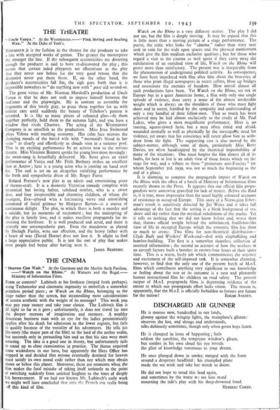THE THEATRE
NOWADAYS lit is the fashion in the theatre for the producer to take a line with accepted works of genius. The greater the masterpiece the stronger the line. If the subsequent eccentricities are diverting enough the producer is said to have re-discovered the play ; this means that certain jaded playgoers see affectations in the play that they never saw before for the very good reason that the dramatist never put them there. If, on the other hand, the producer's eccentricities fall flat, the sigh goes forth that it is impossible nowadays to " do anything new with " poor old so-and-so.
The great virtue of Mr. Norman Marshall's production of Uncle Vanya is that he does not seek to impose himself between the audience and the playwright. He is content to assemble the fragments of this lovely play, to piece them together for us with infinite care until suddenly the beauty of Tchekov's pattern is revealed. It is like so many pieces of coloured glass—fit them together perfectly, hold them to the autumn light, and you have a window that rivals Chartres. The acting of the Westminster Company is as unselfish as the production. Miss Joan Swinstead plays Yelena with startling economy. Her calm face mirrors the changing moods of the bored wife with " mermaid's blood in her veins " as clearly and effortlessly as clouds seen in a summer pool. This is an exciting performance by an actress new to the serious theatre. Miss Vivienne Bennett speaks for young love most movingly : the swan-song is beautifully delivered. Mr. Scott gives an exact performance of Vanya and Mr. Frith Banbury makes an excellent shot at Astrov ; here is a young actor who is coming on hand over fist. The seal is set on an altogether satisfying performance by the fresh and sympathetic decor of Mr. Roger Furse.
Roland Pertwee's new play is an adroit and entertaining piece of theatre-craft. It is a domestic Victorian comedy complete with tyrannical but loving father, subdued mother, who is a sweet dear, and four irrepressible and charming children, of whom the youngest, Eva—played with a fascinating verve and astonishing command of facial grimace by Margaret Barton—is a source of continuous delight. The plot, in which there is both a murder and a suicide, has its moments of excitement ; but the mainspring of the play is family love, and it makes excellent propaganda for in- creasing the birthrate. It is well produced and acted, and there is scarcely one unsympathetic part. Even the murderess as played by Shelagh Furley, wins our affection, and the heavy father with a heart of wax (David Home) does not lose it. It ought to find a large appreciative public. It is just the sort of play that makes most people feel better after having seen it.
JAMES REDFERN.


























 Previous page
Previous page